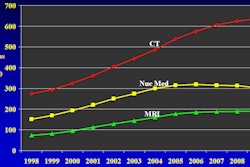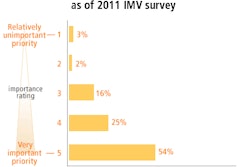A U.S. government investigation has discovered "questionable" billing patterns in portable x-ray services paid for by Medicare, with the federal government paying up to $20 million in unnecessary claims. Government inspectors have recommended stronger controls over Medicare payments for portable x-ray studies.
The U.S. Office of Inspector General (OIG) issued the report this week following an investigation of the appropriateness of Medicare claims paid to portable x-ray suppliers, which totaled $225 million for part B services in 2009. OIG found 20 portable x-ray firms that exhibited questionable billing practices that year, based on the investigation's criteria. Thirteen of those firms were based in the Miami area.
The investigation focused specifically on transportation costs, as some 80% of Medicare payments to portable x-ray firms in 2009 were for transporting and setting up equipment, according to the report. Medicare pays portable x-ray suppliers separately for up to four components of the service, including equipment transportation, setup, exam administration, and image interpretation.
Medicare will pay for full transportation costs once for each trip to a particular location, the report noted: If portable x-ray services are rendered for three patients in a single trip to a nursing home, the agency will pay one-third of the full transportation component for each patient. Medicare also will pay the full component for each return trip. Medicare typically paid $80 for transportation and setup of each portable x-ray exam in 2009, and $17 for administration and interpretation. These payments can be cheaper than ambulance costs for transporting a patient to a stationary x-ray provider, according to the report.
Another aspect of the investigation concerned proper ordering of portable x-ray studies. Medicare rules require that portable x-ray exams must be ordered by a licensed medical doctor or doctor of osteopathy who is treating the patient and who uses the x-ray results to manage the patient's condition. The imaging exam order must state the need for the portable x-ray.
Questionable charges
The OIG investigation found that Medicare rules were violated in a number of cases, resulting in $12.8 million in payments in 2009 for return trips to nursing home facilities. For example, the investigation found that one portable x-ray firm submitted a claim for full reimbursement for two separate trips to two Medicare beneficiaries who were imaged in the same nursing home on the same date. Each claim was paid at the full rate, rather than each claim being paid at one-half the full rate, as required by Medicare rules. The OIG report said that claims data did not indicate whether two separate trips were actually made or whether the firm billed Medicare incorrectly.
Medicare also paid some $6.6 million in claims for portable x-ray studies that were not ordered by physicians and, therefore, should not have been covered. Nurse practitioners ordered $4.3 million in studies, while physician assistants ordered $1 million, podiatrists another $900,000, and other healthcare professionals the remainder. Another $5.9 million was paid for services where the ordering provider's medical credentials could not be determined.
The report acknowledged that while portable x-ray services are a small part of overall Medicare payments for diagnostic imaging services, the investigation raised concerns about payments to certain providers. OIG recommended that the U.S. Centers for Medicare and Medicaid Services (CMS), the agency that administers Medicare, should do the following:
- Take action on portable x-ray firms referred to the agency by OIG.
- Establish a process to identify portable x-ray suppliers that might warrant additional scrutiny.
- Determine what portion of the $12.8 million it paid for return trips in 2009 was incorrectly billed, and collect overpayments.
- Collect the $6.6 million in overpayments for portable x-ray services ordered by nonphysicians in 2009.
- Implement procedures to ensure that Medicare pays for portable x-ray services only when ordered appropriately.
CMS agreed with OIG's recommendations, the report stated, and it recently launched a fraud prevention initiative designed to address many of the claims described in the report. The agency said it was also addressing other recommendations in the report, although it does not have the resources to review portable x-ray claims at this time (the third recommendation) and, instead, would forward a list of questionable claims to the appropriate contractor.



















